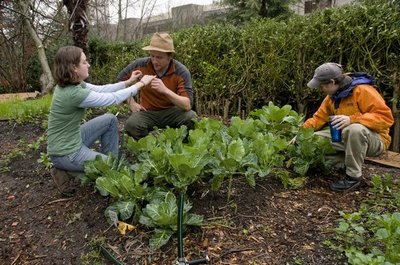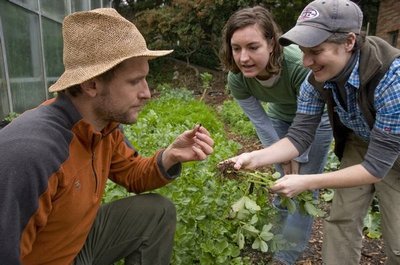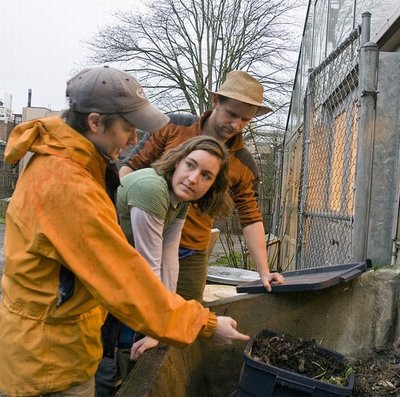February 18, 2010
Farming: It’s right here on campus
While millions of college students spend hours playing the Facebook phenomenon FarmVille, planting and harvesting cyber crops, a group of UW students are doing the real thing on the UW Student Farm.
A group of faculty, staff and students founded the farm in 2004. Since then it has grown with more than 50 students regularly working the crops and many more who drop in from time to time.
“We created the farm as a way to teach students about the impacts of our food choices,” said Elizabeth Wheat, one of the farm’s founders and instructor of Biology 240 (Urban Farm). “It’s a way for students to be part of the process of urban farming—from picking the crops, planting, harvesting, all of it. They see where and learn how food is grown.”
Literature from the UW Farm defines urban farming as “production oriented agriculture that occurs within the city limits. It often utilizes grounds, rooftops, fence lines and other marginal city spaces.”
The farm, which sits next to the Botany Greenhouse along the Burke-Gilman Trail, is 1/3 of an acre and grows about 70 different crops. The produce includes cabbage, carrots and mushrooms.
Every aspect of the farming is an experiential learning activity run by students.
“I love that it’s up to the students,” said Brady Ryan, undergraduate director of the farm. “If you want to grow a certain crop you can. If you want to build a chicken coop you can. Whatever it is, talk with the advisers and it can probably happen. We like to call it a ‘doaucracy’—students really do what they want here.”
There are many ways for students and the campus community to learn more about the farm and to get involved, including Tuesday Farm Lunch, which is offered for one credit and covers subjects like growing fruit trees and how to create a certified organic farm. The public is welcome to sit in.
There are also Cob Oven Pizza Bakes periodically. The oven was added in 2007, and it is made from clay, sand and straw. It has the ability to bake pizza for an entire afternoon using a small amount of wood because the oven absorbs heat from the fire. Ryan said that the Pizza Bakes are a great way to visit and learn more about the farm.
Wheat’s Urban Farm class is all about the principles of the farm. It “develops students’ understanding of the ecological connections between food production, human health, and planetary sustainability. And it teaches basic skills needed for food production in urban areas and the ethics behind sustainable urban agriculture, including a hands-on component on the farm at the biology greenhouse,” according to the Web site.
The farm serves as an outdoor classroom and Wheat said, it is increasingly becoming a larger part of the University curriculum. Beyond Urban Farm, the farm is featured in Environmental Studies: Interdisciplinary Foundations, Foundations in Ecology and Anthropology of Food.
For students who want to get even more involved, there is a Sustainable Agriculture Internship. It’s offered for three credits and gives students an opportunity to design their own project and combine that with research.
Intern Rachel Malinen, who first got involved with the farm last year, has loved her time there and credits the experience with helping her figure out what she wants to do after graduation, which is at the end of this quarter. She has been applying with organic and sustainable farms throughout the Northwest.
Ryan also says that he plans to go into farming upon graduation. As a math major, farming isn’t an obvious choice.
“Math is great, but I’ve always known I wanted to ultimately do something outside,” said Ryan. “I wouldn’t like a job inside. After getting involved with the student farm, I really love farming. I envision coming together with a group of other people in or around an urban sort of setting and creating a farm. I’m not sure what it’ll look like, but it’s what I want to do.”
Wheat said that the experience of working on the farm has inspired many students to go into urban farming or get involved with sustainable agriculture in some way after leaving UW.
As the farm grows in the number of students participating, those involved would like to see it grow in regards to how much land they have. They are in talks with the University to add another acre of land, and organizers are actively looking into identifying more plots around campus for farming.
“We want to keep expanding and are always excited to get new volunteers,” said Ryan. “Anyone who’s interested should visit. It’s a lot of fun.”





